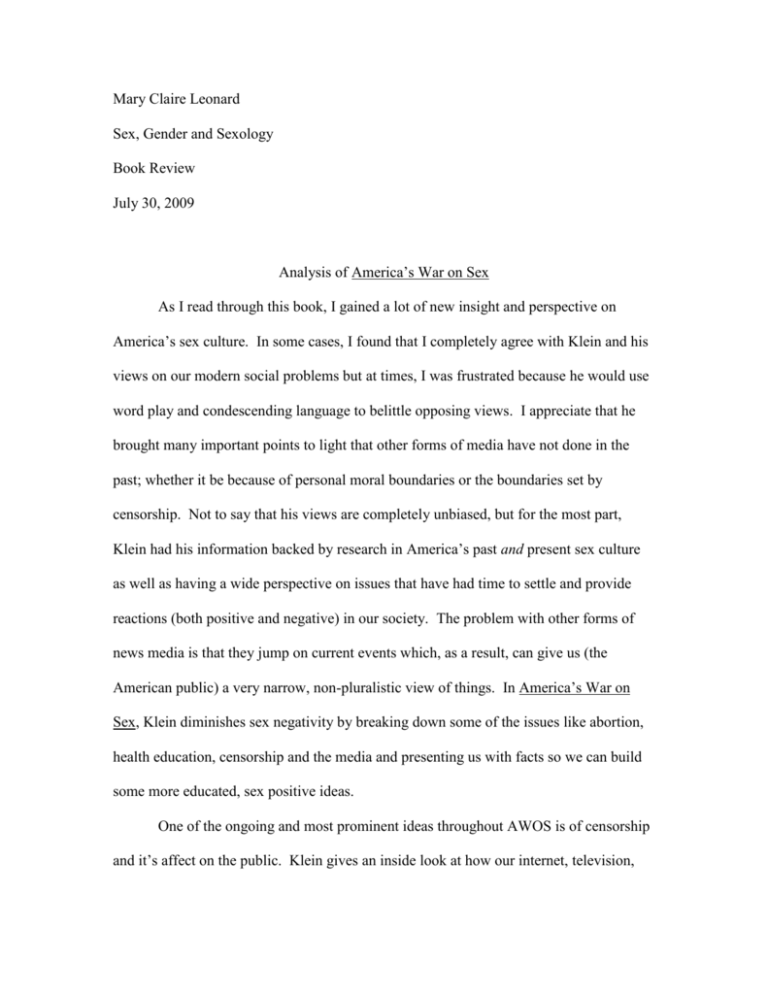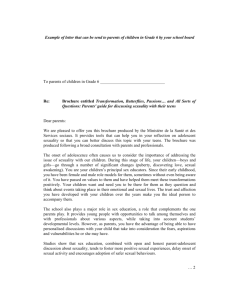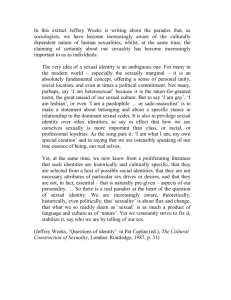
Mary Claire Leonard
Sex, Gender and Sexology
Book Review
July 30, 2009
Analysis of America’s War on Sex
As I read through this book, I gained a lot of new insight and perspective on
America’s sex culture. In some cases, I found that I completely agree with Klein and his
views on our modern social problems but at times, I was frustrated because he would use
word play and condescending language to belittle opposing views. I appreciate that he
brought many important points to light that other forms of media have not done in the
past; whether it be because of personal moral boundaries or the boundaries set by
censorship. Not to say that his views are completely unbiased, but for the most part,
Klein had his information backed by research in America’s past and present sex culture
as well as having a wide perspective on issues that have had time to settle and provide
reactions (both positive and negative) in our society. The problem with other forms of
news media is that they jump on current events which, as a result, can give us (the
American public) a very narrow, non-pluralistic view of things. In America’s War on
Sex, Klein diminishes sex negativity by breaking down some of the issues like abortion,
health education, censorship and the media and presenting us with facts so we can build
some more educated, sex positive ideas.
One of the ongoing and most prominent ideas throughout AWOS is of censorship
and it’s affect on the public. Klein gives an inside look at how our internet, television,
news and education have been edited because of the few people who have decided that
their sex phobic views are the only acceptable and moral ways of seeing things. I like
that Klein presents the question “what is moral?”; some would say that restricting birth
control, health information and rights to sexual choice is immoral, but (regardless of
numbers) these people are considered the minority in American society. Sexual thought
is presented as a natural thing in other countries and the truth is that it should be that way
everywhere. According to Klein, sexual imagery has been a part of cultures throughout
the ages. “What has almost invariably happened for 100 centuries is that new
technologies are used for sexual purposes very early in their development (104)”; and this
raises another issue: why can’t a person view sexual material in the privacy of their own
home? Erotophiles have already had to pay for the limitations of our society. To view
“inappropriate” channels like HBO a person has to pay extra, listening to unedited radio
stations can cost around $200 dollars a year and to watch shows on television that are
considered inappropriate for children (according to FCC standards) you must wait until
midnight and yet groups like Morality in Media and Parents Television Council are still
trying to take away these rights. What little leeway is left for radio and television
broadcasters is often not even utilized due to the fear that they will be fined for
indecency. If I were in their position, I would be afraid too. According to records from
the years 2000 to 2004 FCC fines have increased over six million dollars “without any
substantive change in broadcast content (64)”. Well-known radio broadcasters and
television hosts have been fired over indecency charges just because stations can’t afford
more than one slip up. Amidst his analysis of all of these problems, Klein observes that
an erotophobe is going to see sexual danger in everything. They claim that sexual
material in our media is causing us harm but statistics show that STD frequency, teen
pregnancy and abortion rates are much higher in America than any other country in the
world. When I saw these statistics, I was absolutely shocked. I think that if more people
could see the facts, some might back down from their staunch conservatism and think
about what would be good for our country as a whole. When parents complain that their
children don’t need to see or hear explicit material, they are denying everyone else the
right to view what they want and also losing the opportunity to open up conversation
about sex and other complex issues with their children. It is not that our country can’t
handle sex in the media, it’s that we haven’t taken the initiative to recreate the negative
image that has been put behind sexuality in our country.
One way that we can introduce sex positivity into our society is with early
education. The problem is, “for over a century, America’s approach to youthful
sexuality has been to minimize, distort, and control sexual knowledge, sexual health,
sexual rights and sexual activity of minors (6)”. If minors are not learning facts, how will
they ever learn how to protect themselves? In analyses of health education programs
across the United States it has been found that children are being misinformed and scared
into an “abstinence only” mindset; yet just like the STD, abortion and teen pregnancy
rates, young adults that make vows of abstinence until marriage are more likely to have
unprotected sex than the youth in other countries who are educated about alternative
forms of contraception. In America, youth are taught that condoms fail most of the time,
sex before marriage can lead to emotional problems and that no form of contraceptive can
affectively prevent STD’s. There is also underlying reinforcement of heterosexual
gender roles going on through these programs. When students learn about sex, there is
never any discussion about gay sex and the precautions that need to be taken in order to
protect their (homosexuals) health. This is not a matter of protecting innocent minds.
When it comes to HIV, it’s a matter of life and death and the teaching community needs
to get to the point where they can properly educate all students to protect themselves.
Students are drilled on the diseases that can kill them but other than abstinence, all other
forms of protection are secondary to this scare tactic. The United States health education
system is absolutely sex negative and it needs to be corrected if our youth are going to
grow into responsible, sex positive adults.
As a very sex positive person myself, I found what Klein had to say on women’s
reproductive rights and the “war on pornography” very interesting. Personally, when I
say that I am “pro-choice” I mean that I don’t necessarily think that I would choose to
have an abortion, but I support other women’s right to make their own decision. When
Klein was explaining how those who consider themselves “anti-choice” see things, I just
couldn’t help but think how badly they are going about presenting themselves. They
think that because they choose not to have an abortion, no one else should have the right
to choose. What’s worse is that groups like “Concerned Women for America” are
discouraging doctors and pharmacies from distribution emergency contraception to
women. Seriously, what are these women concerned about? If I saw a woman who could
hardly support herself, much less a child, I’m pretty sure that I would be more concerned
with her well-being. To prevent dangerous abortions that are in the later trimesters of a
pregnancy I definitely think that there should be more abortion clinics throughout the US.
Some women might have to seriously save up just to travel and pay to have the abortion
but by the time they have enough money it could be too late. I also think it’s awful that
many doctors aren’t given the training they need in order to perform abortions. In this
situation, a select few are making a moral choice for those who could have gone out and
made their own decisions. When it comes to the Catholic, non-profit hospitals that Klein
says are so prominent today; I think it’s great that they are working non-profit but if they
are not willing to perform abortions even in an emergency situation they should not be
merging with public hospitals that do offer emergency services.
In the section of AWOS that breaks down some of the reasons for America’s “war
on pornography” I thought it was really interesting where Klein discusses how our
negative associations with porn could actually be stemming from “the fact that so many
of us are taught to feel guilty about our sexual desires, fantasies, and bodies (124)”;
because of these beliefs, many people associate porn with perverts, child molesters and
sexual predators, yet there has been no link made between viewing pornography and
violence or aggression toward others. Another argument is that porn can cause
insecurities amongst the “normal” people but people that feel put down by porn aren’t
usually the ones viewing it. If anything, porn is a way for some people to experience
sexuality and feel more comfortable with them selves without feeling exposed. Looking
back at Klein’s section on internet pornography, he says that images of sex have been a
part of society since public baths were first introduced in ancient civilizations. It is
natural for humans to want to see sexual things, even if what we see isn’t exactly like the
“average” human being.
In Klein’s conclusion, he shares his concern that the sexual industry might shut
down all together if government wins this “war on sex”. This means that sex toys, sex
related television, x-rated dvd’s, nude beaches, strip clubs and any other forms of adult
entertainment would be banned in America. It’s like government is trying to out with the
biggest bang possible; but once it happens, they are going to look around and realize that
people are still doing these things, just illegally. Although new laws might make a few
people wary about the activities they participate in, I do not think that the government is
ever fully going to be able to control the sex trade. The last time a law was established
that was as serious as this ban was back when Comstock banned pornography or any
other sexual material from being sent through the mail. In America today, that law alone
would have a huge impact on our society considering how much we buy and sell through
the internet. If government is successful in their ban of the sex trade they would
definitely cause some very dangerous problems. Women who once worked in strip clubs
and in porn might get under-the-table sex jobs where they put themselves at risk and all
sex-related items that were once sold in stores and online would be distributed in an
underground market. By forcing these trades into such dark places, we’d be re-enforcing
sex negativity with our youth and creating more adults with the same mindset as those
before them. They will live under the impression that they must fear and control all
things sexual and this war on sex will never end. I propose that we do as Klein says in
his section on indecency, “we actually need to move in the opposite direction-from
portraying it [sexuality] poorly to portraying it well (57)”. In order for this to happen, our
society would have to stop fearing sexuality and begin to break apart all of the things in
America that have made us so sex negative (just as Klein has done). American citizens
must be willing to stand up for their sexual rights because government can not and must
not win the war on sex.







